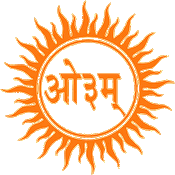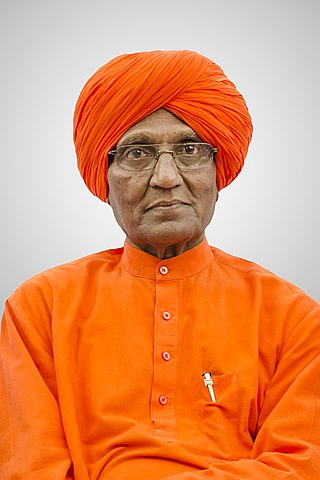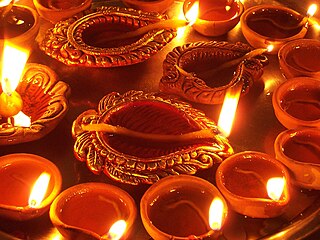
Hindus are people who religiously adhere to Hinduism, also known by its endonym Sanātana Dharma. Historically, the term has also been used as a geographical, cultural, and later religious identifier for people living in the Indian subcontinent.
The following outline is provided as an overview of and topical guide to Hinduism:

Arya Samaj is a monotheistic Indian Hindu reform movement that promotes values and practices based on the belief in the infallible authority of the Vedas. The sannyasi (ascetic) Dayanand Saraswati founded the samaj in the 1870s.

Diwali is the Hindu festival of lights, with variations celebrated in other Indian religions. It symbolises the spiritual "victory of light over darkness, good over evil, and knowledge over ignorance". Diwali is celebrated during the Hindu lunisolar months of Ashvin and Kartika—between around mid-September and mid-November. The celebrations generally last five or six days.

Hinduism has been spread in Russia primarily due to the work of scholars from the religious organization International Society for Krishna Consciousness (ISKCON) and by itinerant Swamis from India and small communities of Indian immigrants. While ISKCON appears to have a relatively strong following in Russia, the other organizations in the list have a marginal presence in this country. There is an active Tantra Sangha operating in Russia. According to the 2012 official census, there are 140,010 Hindus in Russia, which accounts for 0.1% of the population of Russia.

Hinduism is the third largest religion in Australia consisting of more than 684,002 followers, making up 2.7% of the population as of the 2021 census. Hinduism is the fastest growing religion in Australia mostly through immigration. Hinduism is also one of the most youthful religions in Australia, with 34% and 66% of Hindus being under the age of 14 and 34 respectively.

Hinduism is the second largest religious affiliation in Bangladesh, as according to the 2022 Census of Bangladesh, approximately 13.1 million people responded that they were Hindus, constituting 7.95% out of the total population of 165.15 million people. In terms of population, Bangladesh is the third-largest Hindu populated country of the world, after the neighboring countries of India and Nepal. Hinduism is the second-largest religion in 61 out of 64 districts of Bangladesh, but there is no Hindu majority district in Bangladesh.

Hinduism in Trinidad and Tobago is the second largest religion. Hindu culture arrived to Trinidad and Tobago in 1845, with the arrival of the first Indian indentured laborers, the overwhelming majority of which were Hindu. According to the 2011 census there were 240,100 declared Hindus in Trinidad and Tobago.

Freedom of religion in Canada is a constitutionally protected right, allowing believers the freedom to assemble and worship without limitation or interference.

Hinduism is the third-largest religious group in the United Kingdom, after Christianity and Islam; the religion is followed by over one million people representing around 1.6% of the total population. According to the 2021 United Kingdom census Hindus are primarily concentrated in England, particularly in Greater London and the South East, with just under 50,000 Hindus residing in the three other nations of the United Kingdom. Hindus have had a presence in the United Kingdom since the early 19th century, as at the time India was part of the British Empire. Many Indians in the British Indian Army settled in the United Kingdom of Great Britain and Northern Ireland.

Anti-Hindu sentiment, sometimes also referred to as Hinduphobia, is a negative perception, sentiment or actions against the practitioners or religion of Hinduism. It exists in many contexts in many countries, often due to historical conflict. There is also scholarly debate on what constitutes Hinduphobia in the Western World.

Punjabi Hindus are adherents of Hinduism who identify ethnically, linguistically, culturally, and genealogically as Punjabis and are natives of the Punjab region of the Indian subcontinent. Punjabi Hindus are the second-largest religious group of the Punjabi community, after the Punjabi Muslims. While Punjabi Hindus mostly inhabit the Indian state of Punjab, as well as Haryana, Himachal Pradesh, Delhi, and Chandigarh today, many have ancestry across the greater Punjab region, which was partitioned between India and Pakistan in 1947.

Hinduism is the third-largest religion in Canada, which is followed by approximately 2.3% of the nation's total population. As of 2021, there are over 828,000 Canadians of the Hindu faith.

Hinduism in Fiji is the second-largest religion, and primarily has a following among Indo-Fijians, the descendants of indentured workers brought to Fiji by the British as cheap labour for colonial sugarcane plantations. Hindus started arriving in Fiji starting in 1879 and continuing through 1920, when Britain abolished the slavery-like indenture system. Fiji identifies people as "Indo-Fijians" if they can trace their ancestry to the Indian subcontinent, Hindus form about 27.9% the population of Fiji.

Hinduism is the second largest religion in New Zealand. It is also one of the fastest-growing religions in New Zealand. According to the 2018 census, Hindus form 2.65% of the population of New Zealand. There are about 123,534 Hindus in New Zealand.

Swami Agnivesh, was an Indian social activist and the founder of Arya Sabha, a political party based on the principles of Arya Samaj. He also served as a cabinet minister in the state of Haryana. He is best known for his work against bonded labour through the Bonded Labour Liberation Front, which he founded in 1981.

The St. John's Hindu Temple is located in St. John's, Newfoundland and Labrador, Canada. In 1975 Hindus established a Hindu temple in Mount Pearl, Swami Chinmayananda donated a marble statue of Krishna which was installed by Swami Dayananda. The temple functioned as an independent organization with the name Chinmaya Mission St. John's.
Brahmoism is a Hindu religious movement which originated from the mid-19th century Bengali Renaissance, the nascent Indian independence movement. Adherents, known as Brahmos, are mainly of Indian or Bangladeshi origin or nationality.

Worship in Hinduism is an act of religious devotion usually directed to one or more Hindu deities, invoking a sense of Bhakti or devotional love. This term is probably a central one in Hinduism, but a direct translation from the Sanskrit to English is difficult. Worship in Hinduism takes many forms, and its expression vary depending on geographical, linguistic, and cultural factors. Hindu worship is not limited to a particular place and Hindus perform worship in temples and within the home. It often incorporates personal reflection, music, dance, poetry, rituals, and ceremonies. Worship in Hinduism serves various purposes, including seeking blessings, guidance, or specific outcomes, as well as fostering a sense of inner peace and spiritual growth. It can also be an expression of devotion (bhakti) to the deity. The aim is to lead a pure life in order to progress spiritually and eventually attain liberation (moksha) from the cycle of rebirth.
















